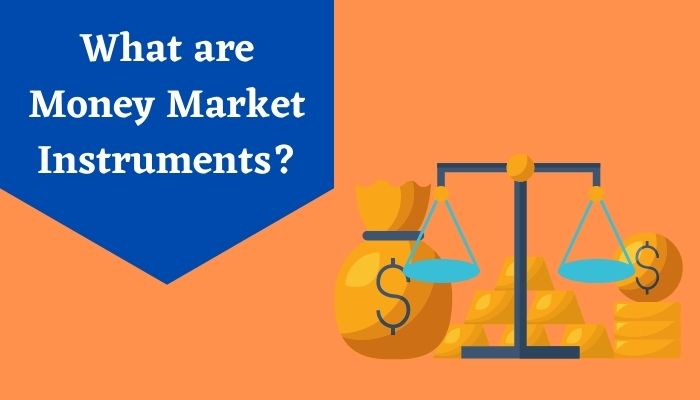What are Money Market Instruments?
Investment planning includes both long-term goals and short-term needs. We need to take a good decision while investing for short-term needs also. Hence, it is important to understand the financial instruments available for short-term investments that can offer greater liquidity. Money market instruments are generally recommended for your short-term needs. Let’s understand more about money market instruments.

What are money market instruments?
The money market is a pillar of the financial system where short-term (usually lesser than a year) financial instruments are traded on stock exchanges. Money market instruments come with two prominent features i.e., higher liquidity and short maturity period. As the name implies, money market instruments are a near substitute for money. The participants in this money market are usually institutional investors, banks, and individual investors. Some of the common money market instruments traded in the market are treasury bills, commercial papers, repurchase agreements, certificates of deposits and bankers’ acceptance, etc.

The interest rate of Indian money market instruments is controlled by the Reserve Bank of India (RBI). These instruments are fixed-income financial instruments with a maturity period of less than a year and thus carry low risk. The money market plays a crucial role in the economy. Money market instruments help borrowers meet their short-term fund needs along with offering liquidity to lenders. This way it helps in striking the balance between demand and supply in the economy resulting in growth and overall development. Let’s take a look at some of the Indian money market instruments.
Types of Money Market Instruments
Following are the types of money market instruments that are usually traded in India.
Treasury Bills: Treasury bills are the most popular money market instruments in India that are issued by the Government of India. The returns from treasury bills are not so attractive as they carry no risk. Treasury bills are issued with varying short-term maturities starting from 14 days duration to 364 days. Treasury bills are issued by the Central Government at a discounted price to their face value. The difference in the maturity value and the buying price of treasury bills is the interest earned by the buyer which is decided based on the bidding done through auctions.
Commercial Papers: Commercial papers are issued by the top-rated companies with the purpose to raise capital directly from the market to meet their working capital requirement. Commercial papers are the unsecured short-term promissory notes issued by high-rated companies. Usually, commercial papers come with a fixed maturity period ranging from 1 day to 270 days. Commercial papers are the money market instruments that can offer a slightly higher rate of interest than the Treasury bills. These money market instruments are actively traded in the secondary market.
Certificate of Deposits: Reserve Bank of India has introduced the Certificate of Deposits in 1989, which later became the preferred money market instrument for the investors as it was low in risk and also offered a better rate of return in comparison to Bank Deposits and Treasury Bills. Certificate of Deposits is freely negotiable term deposits issued through promissory notes at a discounted price to face value just like treasury bills. Certificate of Deposits is issued by the Scheduled Commercial Banks and any All-India Financial Institution. CD works similarly to that of term deposits wherein you deposit money in the Bank for a fixed period and earn interest based on the amount and duration. But they are issued for a high amount and are freely negotiable. Term of Certificate of Deposits may vary from 3 months to one year.
Banker’s Acceptance: Banker’s Acceptance is a short-term financial instrument that works almost similar to that of time drafts. Basically, Banker’s acceptance is a money market instrument issued by the Commercial Banks in India for a short-term promise to pay at a later date. Generally, the maturity period of Banker’s Acceptance ranges from 30 days to 180 days. The process to avail these money market instruments is similar to that of short-term loans. Banker’s Acceptance is traded in the secondary market just like other debt instruments.
Repurchase Agreements: Repurchase agreements, which are also referred to as reverse repo, are the short-duration sale and repurchase agreements between the RBI (Reserve Bank of India) approved parties with the purpose to raise short-term funds. Basically, the repurchase agreement allows to sell RBI-approved securities to another party with a promise to repurchase at a higher price at the later date.
There are various types of money market instruments available in the Indian financial market for the buyers to meet the short-term fund requirements. The government, banks, financial institutions, and businesses along with Individual investors can benefit from money market instruments. Mainly, money market instruments offer the benefit of liquidity due to their short-duration maturity and safety due to their low-risk profile. Money market instruments are mainly meant for short-term financial needs.





























